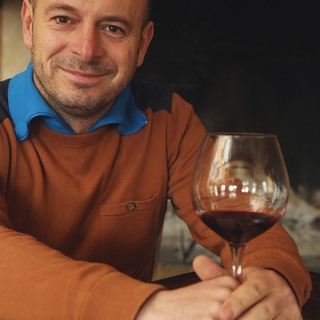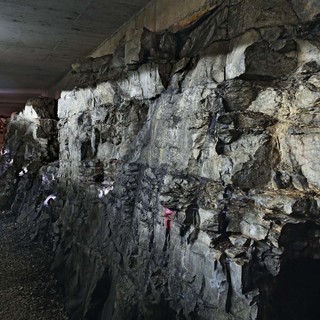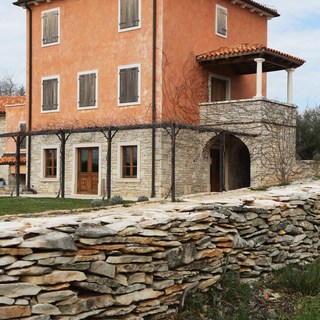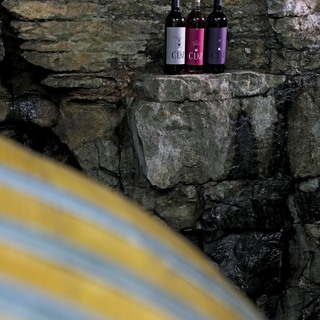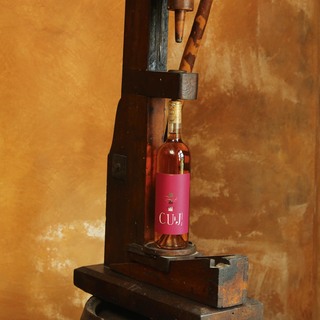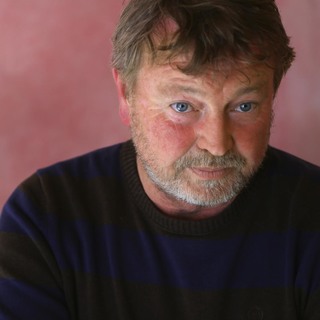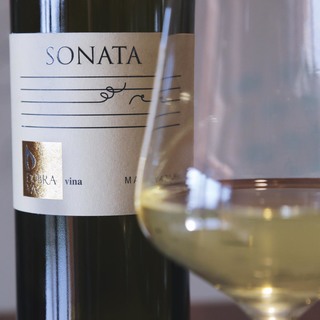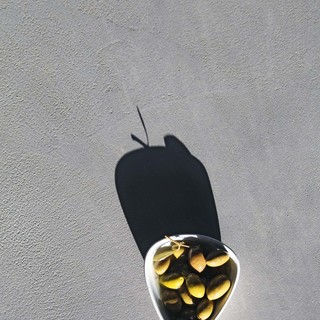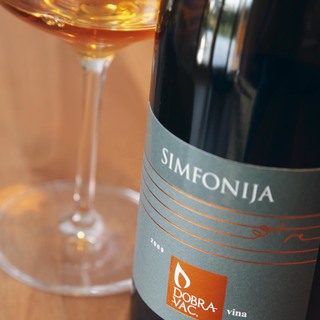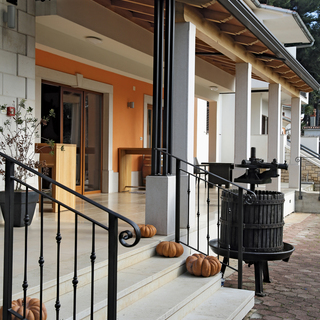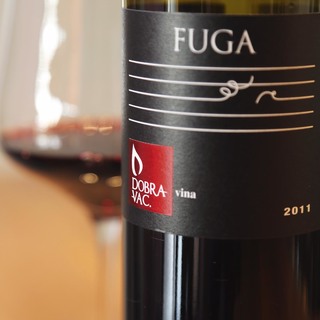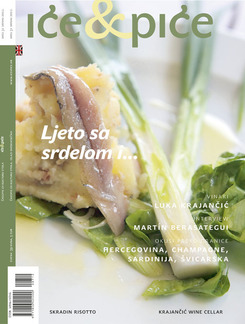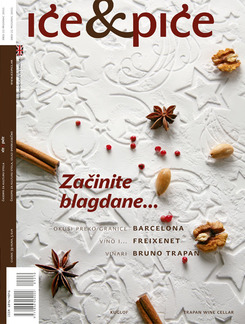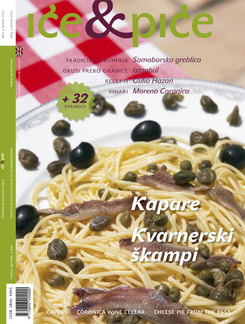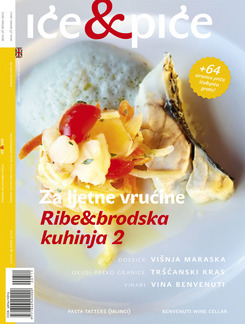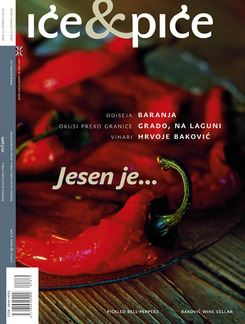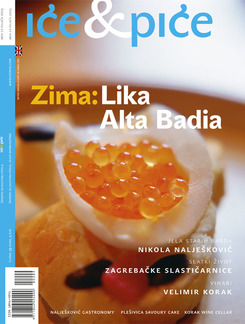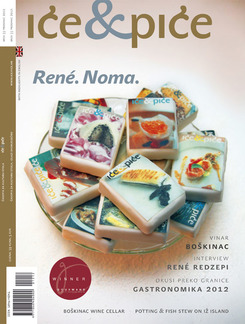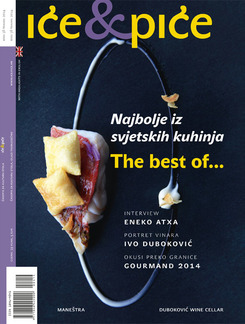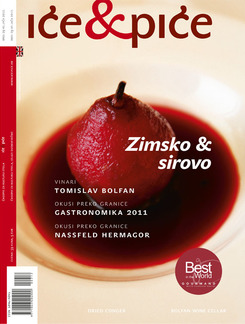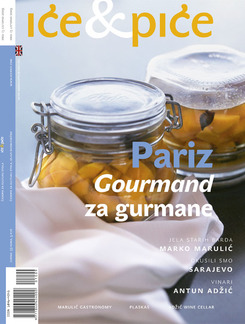Cuj
Danijel Kraljević
Danijel Kraljević, with a degree in winemaking, was born in 1973, and today recalls an incident from his early childhood, when his great grandfather August Zubin, ploughing the land in the vineyard, placed him on the wooden plough between himself and the draught oxen. Little Danijel was proud of carrying out important tasks in the vineyard with his maternal grandfather, and confided to his memory his grandfather’s usual catchphrase of Cuj, neka ti recen... (Listen, let me tell you...) which in the local dialect he addressed to his grandson, the local people and all with whom he talked. Many years later, now that he has continued on with the family viticultural and vinicultural and olive growing tradition with contemporary methods and a visionary project, Danijel has not named his modern winery and olive press after his own surname, rather after the quaint phrase of his grandfather, Cuj, doing honour to a man deeply rooted in the job in which the family farm of his grandson is engaged today.
Contemporary winery and olive mill
Danijel Kraljević did his secondary education in the agricultural school in Poreč, and then enrolled in economics. But just a few exams short of his degree, he decided to continue with his education in the Agriculture Faculty, where he took a BEng in winemaking. At that time he rapidly developed the family business in olive and wine production, fitting up the Cuj mill and winery with contemporary plant, and today in a technologically sophisticated and high capacity mill processes not only his own črna, buža and bjelica olives but also the fruit of the most distinguished Istrian olive producers, Duilio Belić, Klaudio Ipša...
Farnažine, not far from Umag, the birthplace of Danijel’s mother, Renata, in which the Cuj winery and olive mill is located, was once well known for its old lime kilns in which stone was burned to produce lime. The family of his father, Danilo, is originally from around Grožnjan, and on the old stone slab built in above the house door, the name Kraljević and the year 1783 are carved.
The family fields in that impoverished region were planted with grapes and olives, and just to a small extent with arable crops. Although while he was a teenager Danijel dreamed of getting as far away from the land as he could, in his riper years, on the verge of his thirties, Danijel was increasingly enthusiastic about grapes and olives, as if the seed that his grandfather August had planted in his childhood had suddenly sprouted. As the only son, he took on the responsibility for the continuation of the family agricultural tradition.
Three grape-growing sections
The family owns about six hectares of vineyard. This year they are planting vines on two more hectares, and plan for ten all told, thus reaching an area that will satisfying their viticultural ambitions without conflicting with the production capacities. Not far from the house is the Baština section; another is the section called Vela Boška on the way to Umag, while the third is Sveta Lucija, by Buje, white soil obtained from the father of Danijel’s wife Antonija, who is a bookkeeper and has put her own skills to work in the family business. All three sections are planted with Malvazia (about 65%), while at the Vela Boška section, in a part with deep red soil rich in minerals there is Teran (20%), Chardonnay, Muscat and Merlot. Current production runs to about 40.000 bottles, and the objective – after the planting of the new vineyards – is 50.000 bottles, the capacity of the cellar.
This is the golden number, the amount I think I can completely control, market properly and concentrate on incessant improvement of the quality of the wine. Every increase in production would need new investment in the cellar, and expansion of capacities. But I intend to concentrate on the quality of the products and on bringing the existing equipment up to date, which is an unceasing need in winemaking. I provide the market with what I like myself, young, fresh wines which are sometimes harder to produce than wine that has aged, which in the ageing process in the cellar can even get better. Twenty years ago we started to produce what is today a very popular rosé, which found particular favour among foreigners, after which our own wine bibbers accepted it both hands. People often think that only women like rosé, although I think that men prefer it. We make it out of Teran (about 70%), Merlot (25%) and the old variety Hrvatica, which a subcontractor grows for us (5%). Rosé is not just a summer wine, and our label with its identifiable and strong structure fits well into my vision of fresh wines with character, says Danijel Kraljević.
Three generations of winemakers
Danijel Kraljević belongs to a third generation of Istrian winemakers, who developed on the wine scene after the first – Matošević, Kozlović and Degrassi – and second generation – Coronica, Armano, Pilatto and others.
Part of the winery is dedicated to the tasting room, envisaged for visits by small groups of tourists in the summer, and for business discussions and arrangements organised in advance out of season. About 90% of the wines are sold on the domestic market, the rest going for export to Italy and the Benelux countries.
The cellar is part cut out of the solid rock, which is left on show in the cellar space. The rocks cut out have been used for making the dry stone walls that compose the house. The stone is ground down into sand and mixed with cement and used for concreting. The sieved red soil from the vineyard, mixed with lime, is brushed in the old manner onto the facade, creating the terracotta facing of the house, fitting gracefully into the landscape.
The Kraljevićes have about 1200 olive trees and plan to plant another 1500 to bring the total number up to about 3000. Depending on the year, they produce about 3000 litres of first-rate oil.
Danijel hopes that his son Evan is going to join him in the family business, after he has completed his agricultural secondary school in Poreč, and perhaps his younger daughter Lara will get involved as well.
Listen, let me tell you... let it just go on that way, grand-dad August might have said were he still alive.
Dobravac Wines
If you visit Rovinj, one of the finest cities on the Adriatic, getting into it along the oldest road that leads from Kanfanar towards the bay of Valdibora, you cannot help but pass by the estate of the Dobravac family. At the address Karmelo 1, alongside the little church of Our Lady of Carmel, you turn off to the Dobravac holding. From the yard there is a lovely view of the old core of Rovinj, and also in this handsome arrangement is the little family winery. As well as owning the winery, the family has a lovely vacation villa. They are all engaged in the business: Damir Dobravac, his wife Natalina and the children Carla and Matej.
The Dobravac winery produces six labels. They all have musical names and like music go from lighter to heavier. The names, Suite, Sonata, Symphony, Toccata, Fugue and Allegro were invented by Damir’s good friend, serious musician Massimo Brajković. Being into wines, and spurred by entirely non-commercial impulses, is a satisfaction on its own for Damir Dobravac, something that he was able to afford himself only after a successful career as one of the biggest producers of fruit and vegetables in Istria. From their own fields, in a circle of three kilometres from Rovinj, Dobrovac has supplied hotels and restaurants as well as shops with their first-class produce for a full two decades, their motto being the shortest route from field to table. Nevertheless, the long suppressed passion for winemaking is also rooted in the family tradition. In 2008, this passion took shape in the form of their own wine labels. Damir’s father Gašpar and his mother Foška moved in the 1950s to Rovinj, and quickly built up a house from which today’s impressive holding grew. Gašpar and Foška from the beginning were engaged in the trades they had learned in their native villages – olive growing, viticulture and winemaking. As well as this, they started letting out rooms to the first post-war tourists who began to visit Rovinj.
When young Damir took over the business, he improved it, having taken a course at Economics College, while his wife Natalina, of Rijeka-Istria descent, took a degree in Opatija’s Tourism Management Faculty. The young couple started in the crisis years of the war to get down to the business of building up the family holding. The discovery of a spring helped the rapid development of the production of fruit and vegetables.
But Damir never gave up dreaming of his own vineyard and his own wines, which came anyway very rapidly. First of all he ploughed up the old vineyards and on new and much better sections laid down new plantations, mainly of landrace varieties – Malvazia, Teran and Muscat. To these indigenous varieties he added international grapes like Chardonnay, Merlot, Cabernet Sauvignon and Cabernet Franc, which turned out excellent for blends with domestic varieties. Today the Dobravac winery has 5 ha of vineyards, and produces about 15.000 bottles. In line with the family tradition, a smaller amount is sold from the cask. The Dobravac family is proud not only of its wine but also of its excellent extra virgin oil, a blend of seven varieties of olive. At the same time it has developed a project for B&B accommodation called Villa Dobravac, open since 2006. This luxury accommodation facility can receive up to 40 guests at a time, serving them an outstanding breakfast including home-produced fruit and vegetables. By way of addendum to the wine story, in 2014 they opened up a wine bar in which they serve their own wines and other select drinks. They lay on tasty snacks to accompany the wine, based on Istrian specialities as well as their own fruit and vegetables. They have confided the running of the wine bar to one of the best Croatian sommelières, Karin Rupena-Perdec, who has a wealth of experience. The wine bar offers authentically Istrian cured meats, sausage, ombolo, dried ham and various cheeses while for special occasions Karin will also prepare whole menus.
Since winemaking is not something on which his livelihood depends, rather a means to satisfy his own passions, Damir has surrendered completely to his own philosophy of production of wine, where quality is in prime of place, not quantity.
I produce the kind of wines I personally like drinking and that I enjoy, aware that my wines are different in Istria, simply, special. I think that through the wine you have to be able to sense the personality and individuality of the actual maker. Along with baked or grilled fish, the strongly macerated Malvazia goes excellently. For me Malvazia is a wine with a great deal of taste, a full body, less of a fruit aroma, less freshness, more complexity and maturity. In the Rovinj area there is mainly red soil, close to the sea, and this terroir gives the wines a powerful minerality and makes it different from the other Istrian Malvazias. It’s good for our Malvazia to know a bit of a drought, for then the root tries harder to find the water, and that makes it hardier, and this is felt in the structure of the actual wine. As you know our wines are named after kinds of music (the idea of Massimo Brajković has won lots of plaudits). We are starting with a light, perky and fresh Istrian Malvazia that we call Suite. The next wine is one of the best sellers, Istrian Malvazia Sonata. After Sonata, we have our special vine that can be classified as orange, and that is Symphony. This blend of Malvazia and Chardonnay is aged several years in big oak barrels and at least 6 more months in bottles before being released. As for red wines, we have two types of Bordeaux coupages, with additions of local Teran, the cuvee Toccata, a wine lighter than Merlot, Teran, Cabernet Sauvignon and Cabernet Franc. We also have a more serious red cuvée, Fugue, dominated by Teran with smaller additions of Cabernet Sauvignon and Cabernet Franc. This wine is aged at least two years in barrique casks. Finally we have Allegro, a late vintage of dried berries of Yellow Muscat, which can go well with a wide range of chocolatey desserts. Soon coming onto the market is our sparkling wine from Istrian Malvazia obtained by typical in-bottle fermentation, which has aged four years on the yeast. Half of our annual production is accounted for by Sonata Malvazia, and I’m thinking of making a Sonata Reserve from good vintages. For the moment, I am just very well pleased with my wines, which I always want to improve, for them to be better than ever and our customers to be well satisfied.
Since he has many years of experience with fruit and vegetables, always aspiring to produce tastier and tastier crops, Damir applies in grape growing a technique that brings a good tasting fruit. The secret lies in the quality of the vine leaf and the relation between leaf mass and fruit. The Dobravac Winery and its wines are mostly to be found in Rovinj and surroundings, where the top hotels and restaurants are supplied. The wines are also slowly appearing in Zagreb. Damir and Natalina are best pleased when the guests in the villa enjoy their wines and take some away with them. This is where the export component of their production comes from.
When a guest of the Villa Dobravac relaxes on the terrace with a glass of cold Sonata, he has a lovely view in front of him of the panorama of Rovinj. They perhaps don’t realise that Gašpar and Foška had the same vision when they were cutting pršut for their guests and pouring the traditional Malvazia, which was pretty similar to Damir’s Symphony. But they perhaps couldn’t imagine that their son and daughter-in-law would be able bring that vision up to the current heights.
